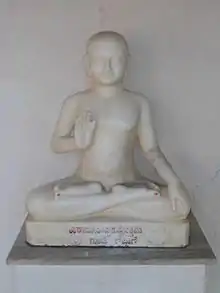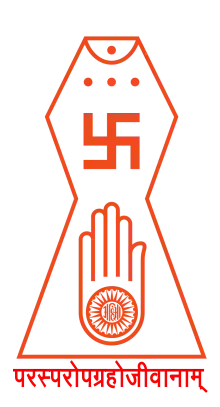Jinasena
Jinasena (c. 9th century CE) was a monk and scholar in the Digambara tradition of Jainism.[1] He was patronized by the Rashtrakuta king Amoghavarsha I.[1] He was the author of Adipurana and Mahapurana.[1][2]
Acharya Shri Jinasena | |
|---|---|
जिनसेन | |
 Image of a Digambara Acharya | |
| Personal | |
| Religion | Jainism |
| Sect | Digambara |
| Religious career | |
| Predecessor | Virasena |
Disciples
| |
| Initiation | by Virasena |
| Part of a series on |
| Jainism |
|---|
 |
|
|
Jinasena was the disciple of Acharya Virasena and he completed the commentary Dhavala on Ṣaṭkhaṅḍāgama, a revered text in the Digambara tradition. The name is shared by an earlier Acharya Jinasena who was the author of Harivamsa Purana.[3]
Life
Acharya Jinasena was a 9th-century CE Jain scholar who belonged to the Panchastupanvaya.[4] He was a disciple of Virasena.[5] He claimed that Rishabhanatha first taught humanity how to extract sugarcane juice and that the fire by itself was not divine.[4][6] Rastrakuta king Amoghavarsha was his disciple.[7]
Works
He wrote the encyclopedic Adipurana.[7] Mahapurana includes Ādi purāṇa[8] and Uttarapurana, the project was completed by his pupil Gunabhadra.[9]
Mahapurana is the source of the famous quote, used by Carl Sagan and many others:[10][11]
Some foolish men declare that Creator made the world. The doctrine that the world was created is ill-advised, and should be rejected. If god created the world, where was he before creation? If you say he was transcendent then, and needed no support, where is he now?
No single being had the skill to make the world - for how can an immaterial god create that which is material? How could god have made the world without any raw material? If you say he made this first, and then the world, you are face with an endless regression. If you declare that the raw material arose naturally you fall into another fallacy, for the whole universe might thus have been its own creator, and have risen equally naturally. If god created the world by an act of will, without any raw material, then it is just his will and nothing else and who will believe this silly stuff?
If he is ever perfect, and complete, how could the will to create have arisen in him? If, on the other hand, he is not perfect, he could no more create the universe than a potter could. If he is formless, actionless, and all-embracing, how could he have created the world? Such a soul, devoid of all modality, would have no desire to create anything. If you say that he created to no purpose, because it was his nature to do so then god is pointless.
If he created in some kind of sport, it was the sport of a foolish child, leading to trouble. If he created out of love for living things and need of them he made the world; why did he not make creation wholly blissful, free from misfortune? Thus the doctrine that the world was created by god makes no sense at all.
[from Barbara Sproul, Primal Myths (San Francisco; Harper Row, 1979), 192].
He also wrote Dharmashastra, a lawbook for laymen.[6]
See also
References
Citations
- Early medieval developments (500–1100), Encyclopaedia Britannica
- Colette Caillat; Nalini Balbir (2008). Jaina Studies. Motilal Banarsidass. pp. 122–123. ISBN 978-81-208-3247-3.
- Jinasena, Acharya; Jain (Sahityacharya), Dr. Pannalal (2008) [783 AD], Harivamsapurana [Harivamsapurana], Bhartiya Jnanpith (18, Institutional Area, Lodhi Road, New Delhi - 110003), ISBN 978-81-263-1548-2
- Natubhai Shah 2004, p. 15.
- Jain Dharma ka_Maulik Itihas_Part 3, Ed. Gajsingh Rathod, 2000, Jain Itishas Samiti, p. 652-656
- Doniger 1993, p. 238.
- Narasimhacharya 1988, p. 2.
- Granoff 1993, p. 208.
- Voices of Unbelief: Documents from Atheists and Agnostics, Dale McGowan, ABC-CLIO, 2012, p. 23
- Sources of Indian Tradition, Ainslie T. Embree, Columbia University Press, 1958, p. 77
- "The Edge of Forever," of "Cosmos," by Carl Sagan, epigraph to chapter 10, 1980, p. 140
Sources
- Doniger, Wendy, ed. (1993), Purana Perennis: Reciprocity and Transformation in Hindu and Jaina Texts, State University of New York Press, ISBN 0-7914-1381-0
- Granoff, Phyllis (1993) [1990], The Clever Adulteress and Other Stories: A Treasury of Jaina Literature, Motilal Banarsidass, ISBN 81-208-1150-X
- Narasimhacharya, Ramanujapuram (1988), History of Kannada Literature (Readership Lectures), Asian Educational Services, ISBN 81-206-0303-6
- Shah, Natubhai (2004) [First published in 1998], Jainism: The World of Conquerors, I, Motilal Banarsidass, ISBN 978-81-208-1938-2
External links
 Media related to Jinasena at Wikimedia Commons
Media related to Jinasena at Wikimedia Commons
